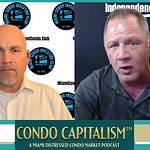We’re No. 1!
Miami has been ranked the riskiest residential real estate market for owner-occupied properties in the world, according to a new study by the Switzerland-based investment bank UBS.
The latest edition of the UBS “Global Real Estate Bubble Index” report analyzed 25 international-oriented cities, ranging from Sao Paulo to Toronto, New York to Hong Kong, to determine the vulnerability of cities to corrections based on real estate fundamentals.
“Fueled by a booming luxury market, prices in Miami have risen by almost 50 percent since the end of 2019, 7 percent of which was in the last four quarters in real terms,” according to the September report. “Imbalances have increased significantly in recent years, and the bubble risk in Miami has risen to (a) high level this year.”
For the first time ever, Miami has grabbed the top spot based on a bubble risk score of 1.79. Tokyo was second with a score of 1.67 and Zurich was third with a score of 1.51.
Rounding out the top five riskiest international residential real estate markets are Los Angeles with a score of 1.17 for the fourth position and Toronto at fifth with a score of 1.03.
The bubble risk score - which is "aligned with historical bubble episodes” - categorizes international real estate markets into four categories:
High (1.50 and above)
Elevated (1.00 to 1.49)
Moderate (0.50 to 0.99)
And Low (0.49 and below).
UBS defines a bubble as “a substantial and sustained mispricing of an asset, the existence of which cannot be proved unless it bursts.”
The “Global Real Estate Bubble Index” report makes clear that it “does not predict whether and when a correction will set in” but rather identifies the areas that could be most vulnerable to a price drop.
As for what causes a bubble to deflate, the report states that it is often “a change in macroeconomic momentum, a shift in investor sentiment or a major supply increase.”
Miami previously ranked No. 3 in 2023, No. 10 in 2022 and No. 12 in 2021, according to a review of previous reports.
Miami replaced Chicago in 2021 as one of the 25 international-oriented cities analyzed by UBS.











